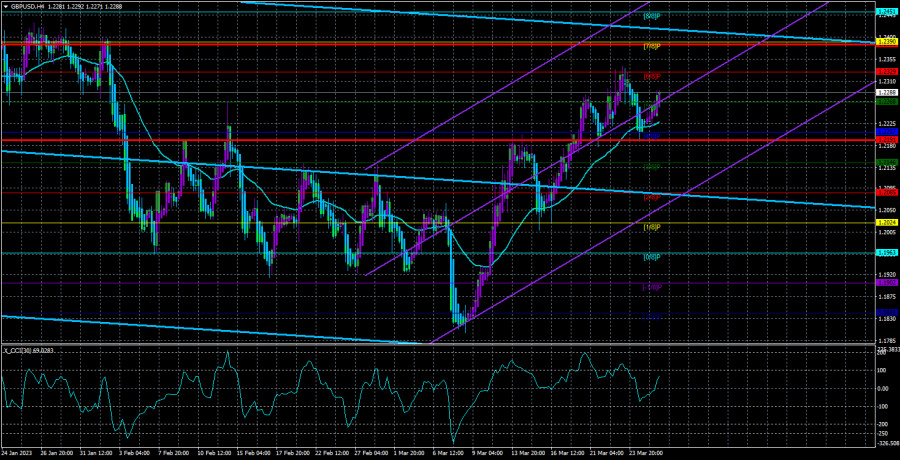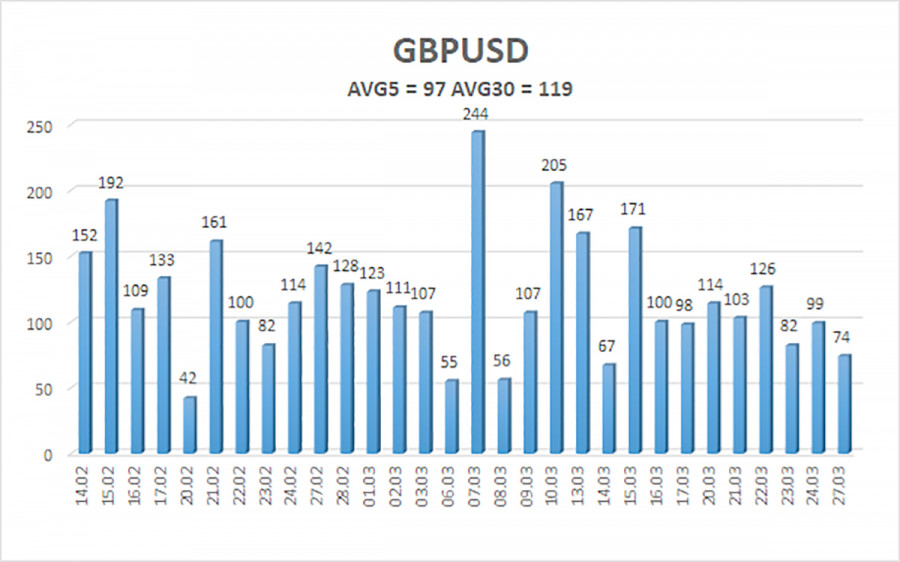On Monday, GBP/USD broke through the moving average. It is now trying to resume the uptrend. We still believe there have been no reasons for growth in GBPUSD, which is still moving within a 600-pip-wide sideways channel in the 24-hour time frame. That is why that price may rise to 1.2440 without any drivers. Moreover, there have been almost none. The events of the past few weeks provided no support for the pair. In terms of fundamentals, there were just a few factors exerting pressure on USD. The introduction of the emergency program by the Fed and the looming end of tightening are perhaps the most important of them all. Still, GBP/USD has not even recovered after the recent 2,100-pip rise. Thus, it may recoup the losses of the past 2 years in a few months.
The pair has not settled below the MA yet. Therefore, selling would be the wrong thing to do. We may sell near the 1.2440 mark without a signal coming from the 4-hour time frame. However, this level has not been reached yet. The price has been breaking the MA regularly. We do not anticipate growth in GBP/USD shortly because the Bank of England will hardly raise rates significantly.
In the United States, St. Louis FRB President James Bullard and Minneapolis FRB President Neel Kashkari delivered speeches. Kashkari talked about a looming recession and the banking crisis. He stressed that banking woes may harm real estate and construction and that the banking system remains resilient. Bullard addressed the need for further rate hikes and said there was a low probability of a recession in the United States. Notably, Bullard has always been a hawk. This year, however, he does not have the right to vote. In other words, his hawkish words will not affect interest rates anyhow. He does not expect any dramatic rate increases from the Fed this year, which means the end of the tightening cycle is nearing. He also mentioned one more rate hike at the coming meetings. So, the regulator may soon pause hiking rates.
Speaking of the Bank of England's stance on interest rates, we believe the regulator will not be hawkish all year. It has already reduced the pace of rate hikes to a minimum. If the bank wanted to lift rates by another 2-3%, it would go on with 0.50% increases. Because it did not, we may anticipate up to 3-4 hikes by 0.25%. That is why, the pound has limited growth potential. It may be now in a prolonged consolidation phase we tackled about a couple of months ago. So, the pair may fluctuate by 500-600 pips until one of the banks starts monetary policy easing or new financial woes trigger market jitters.
On March 28, the 5-day volatility of GBP/USD is 97 pips and is seen as mild. The pair is likely to move within a channel between 1.2191 and 1.2385. Heiken Ashi's downward reversal will indicate a correction.
Support:
S1 – 1.2268
S2 – 1.2207
S3 – 1.2146
Resistance:
R1 – 1.2329
R2 – 1.2390
R3 – 1.2451
Outlook:
In the 4-hour time frame, there are attempts to push GBP/USD higher. We buy with targets at 1.2329 and 1.2385 until Heiken Ashi's downward reversal and sell after consolidation below the moving average, targeting 1.2146 and 1.2085.
Indicators on charts:
Linear Regression Channels help identify the current trend. If both channels move in the same direction, a trend is strong.
Moving Average (20-day, smoothed) defines the short-term and current trends.
Murray levels are target levels for trends and corrections.
Volatility levels (red lines) reflect a possible price channel the pair is likely to trade in within the day based on the current volatility indicators.
CCI indicator. When the indicator is in the oversold zone (below 250) or in the overbought area (above 250), it means that a trend reversal is likely to occur soon.











